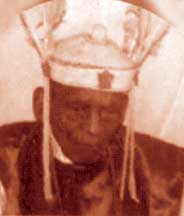
 |
Urhobo States |
|---|
|
Urhobo Websites |
|
|
|
|
THE URHOBO KINGDOM OF OROGUN
HISTORY The Oroguns migrated from Ughelli to Aboh through the river. In Aboh, they helped to kill a Benin war general called Obiegbe waged wars against the Abors. The Obi of Aboh for fear of the powers of the Oroguns was believed to have prepared a spell that made the Oroguns migrate from Aboh to the present day Orogun. FESTIVALS The celebration starts in the morning with war dance by the youths who dance across the main streets of Orogun in groups brandishing guns and cutlasses. Later in day each of the towns and villages that make up Orogun Kingdom will then dance from their respective towns and villages to Erose-shrine in Orogun with their various warlords (Ochu) leading each of the dancing troupes for cleansing from any shortcoming over the year. The "Ochu" wear headgear made of eagle bird feathers and cleansing is done with a white cook, at the presentation of special long shaped native chalk. In the evening, after the various village troupes have visited the shrine, they would dance back to their villages while the women and young girls will take over. The dance of the women is know as "Ighomon", it is Largely done with the singing of vulgar songs and marking of vulgar statements and gestures. The festival continues into the night with social parties. The next seven days is for the exchange of pleasantries. During the festival farmers are forbidden to go to farm and no form of burial ceremonies are allowed. THE SIGNIFICANCE OF THE FESTIVAL On getting to riverside while escaping, they could not find their boats, but instead the saw what appeared logs across the river, on which they crossed the river. Upon successfully crossing the river, they discovered that it was Iguanas that formed a chain across the river for them to get to safety. IGUANA: The Iguana is sacred animal to the Orogun people who may not kill or eat it. The myth has it that Orogun people were initially settled around the Aboh area where they had problems with Benin traders which resulted in the killing of the Benin traders, fear of possible reprisal from the great ancient Benin kingdom made them to move to their present location.
|
 |
|
HRH Matthew Iwemife |